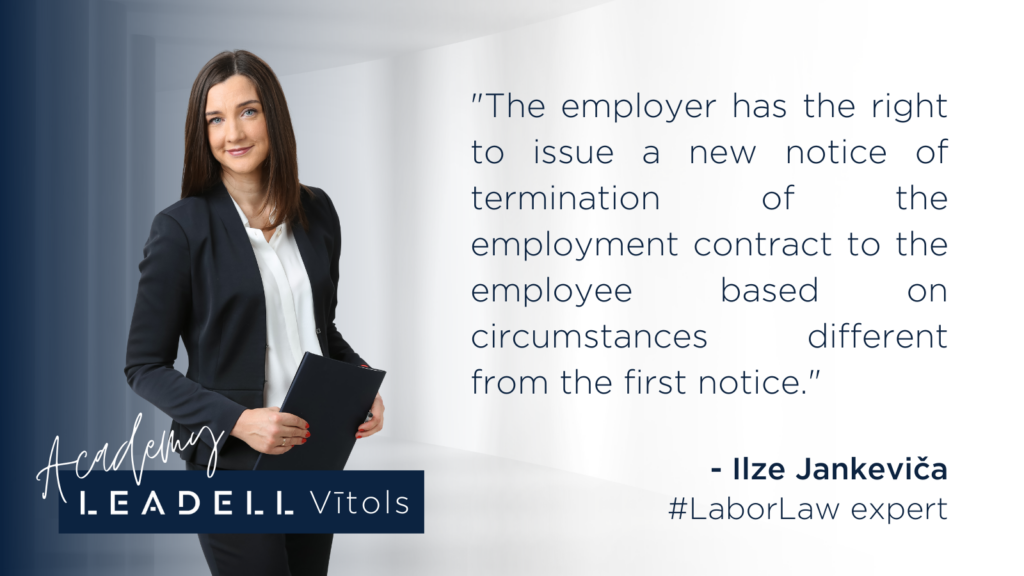News
Two notices for one employee | LEADELL Academy
An employer has given notice of termination to an employee. The employee’s trade union had not consented to this notice, hence the employer is demanding the termination of the employment contract in court. In parallel with the legal proceedings, the employer issued another notice to the employee, which the employee challenged in court.
The substance of the case
In the specific case, the employer had reduced the number of employees by liquidating the employee’s position and giving notice of termination to him. In the process of issuing the notice, it was found that the employee is a member of the trade union, therefore the employer approached the trade union to receive its consent to the termination of the employment contract. Since the trade union did not consent to the notice, the employer applied to the court with a claim for the termination of the employment contract, pursuant to the Labor Law (LL):
- Paragraph 1, Section 98 (employee does not agree to continue employment relationship in conformity with amendments to the employment contract proposed by the employer);
- Clause 9, Paragraph 1, Section 101 (the employer has the right to give written notice of termination of an employment contract if the number of employees is being reduced);
- Paragraph 4, Section 101 (the employer can not employ the employee with his or her consent in other work in the same or another undertaking);
- Paragraph 1, Section 104 (reduction in the number of employees);
- Paragraph 4, Section 110 (if the employee trade union does not agree with the notice of termination of an employment contract, the employer may bring an action in court for termination of the employment contract).
The employer’s claim was satisfied both by the judgment of the court of the first instance and the court of appeal, but during the proceedings, while the pending case was still in the court of appeal, the employer issued a notice of termination of the employment contract to the same employee on a different basis. The employee brought a claim for the annulment of this notice. The court of appeal rejected the employee’s claim. In like manner, later, after the cassation complaint had been submitted by the employee, the initiation of cassation proceedings was refused by the decision of the Senate, thus the decision to reject the employee’s claim came into force.
Nonetheless, while considering the employee’s cassation complaint concerning the employer’s initial claim to terminate the employment contract, the Senate, taking into account the specific factual circumstances, decided to revoke the regional court’s judgment, which had considered the employer’s claim for the termination of the employment contract, and decided to terminate the legal proceedings in the case.
Which notice should be applied and at what point?
On January 27, 2022, the Senate issued a decision in the case SKC-15/2022, ruling on the court’s duty to suspend the proceedings in the case of the employer’s claim for the termination of the employment contract, if the employee has disputed the notice issued to him later by the employer on another basis. In the judgment, the Senate found that, when examining the employer’s claim on the merits, the appellate court had not taken into account the circumstances that changed during the trial of the case, and this led to the adoption of an unjustified verdict.
The Senate pointed to several considerations in the reasons for the verdict. First of all, if the trade union does not consent to the termination of the employment contract of its member, the law gives the employer the right to bring a relevant claim in court. The employment relationship established between the parties continues until the court judgment comes into force, by which the claim for the termination of the employment contract is satisfied. Therefore, the employer has the right to issue a new notice of termination of employment to an employee who has violated the terms of the employment contract based on other circumstances different from the first notice.

Secondly, disputes in the employer’s claim for termination of the employment contract and the employee’s claim for invalidation of the notice of termination are resolved in parallel legal proceedings, because, taking into account that they have a completely different basis and subjects, the prerequisites provided for in Article 134 of the Civil Procedure Law (CPL) do not exist to consolidate such claims into one case.
Furthermore, the Senate pointed out that the law does not provide for termination of the employment contract with the same employee, but on different grounds, therefore consideration of the employer’s claim is not permissible before the legal proceedings in the case of the employee’s claim are fully concluded. If the employee’s claim is rejected by an effective court judgment, the employment contract between the parties is terminated on the day mentioned in the notice, therefore the employer loses the right to request termination of the employment contract on other grounds. On the other hand, the prerequisite for continuing the legal proceedings initiated by the employer is a court ruling in favor of the employee, which satisfies his claim, recognizing the second notice as invalid, reinstating the employee in position and collecting remuneration for forced absence from work.
Since the appellate court had considered the employer’s claim, without taking into account the parallel proceedings of the employee’s claim, the Senate stated that there is a reason to revoke the judgment of the appellate instance and terminate the proceedings in the case, finding the feature specified in Article 223, Clause 2 of the CPL – due to changed circumstances, the plaintiff ( employer) has lost the right to bring an action.
Judgment
Therefore, if during the examination of the employer’s claim (in accordance with Paragraph 4, Section 110 LL) regarding the termination of the employment contract, the employee has contested the notice later issued to him by the employer on a different basis, the further consideration of the employer’s claim depends on the outcome of the employee’s claim. Hence, the procedural mechanism provided for in Clause 5, Article 214 CPL is applicable, which imposes on the court the obligation to suspend legal proceedings before another case has been decided. Until the final consideration of the case of the employee’s claim, the court is obliged to suspend the legal proceedings in the case of the employer’s claim.
Several important conclusions applicable in practice arise from the specific judgment:
- if the employer brings an action in court for the termination of the employment contract, the employment legal relationship does not come to an end. In such a case, the employment relationship can be terminated only by an effective court judgment, if the court has recognized the claim as justified;
- bringing an action by the employer in court for termination of the employment contract does not prevent him from issuing a notice of termination to the same employee on a different basis, since the notice is issued during an existing employment relationship;
- one legal employment relationship with an employee cannot be terminated on several different grounds;
- the employer’s claim against the employee for termination of the employment contract and the employee’s claim against the employer for invalidating the notice of termination must be considered in parallel legal proceedings, as there is no reason to combine them in one proceeding;
- if there is a legal proceeding in the employee’s claim for invalidating the notice of termination and a legal proceeding in the employer’s claim for terminating the employment contract, the employer’s claim shall be suspended until the decision in the legal proceedings for invalidating the notice of termination comes into force;
- by rejecting the employee’s claim for invalidation of the notice, the legal employment relationship, i.e. the employment contract, between the employee and the employer is terminated on the day mentioned in the notice, thus the employer loses the right to claim the termination of the employment contract. The absence of the right of action is the basis for terminating the legal proceedings in the case of the employer’s claim.
What to do in case of uncertainties?
LEADELL Vītols team actively provides professional support in labor law matters to clients. Entrust these and other labor law issues to us: riga@leadell.com
Attorney-at-law Ilze Jankevica shared her knowledge at the LEADELL Academy and he would be pleased to help you in finding solutions to issues arising from employment relations.
Read more:
Does the period of suspension from work grant the right to annual leave? | LEADELL Academy
When does the notice of termination take effect during the probationary period | LEADELL Academy
Categories
Subscribe to Leadell's Newsletter







